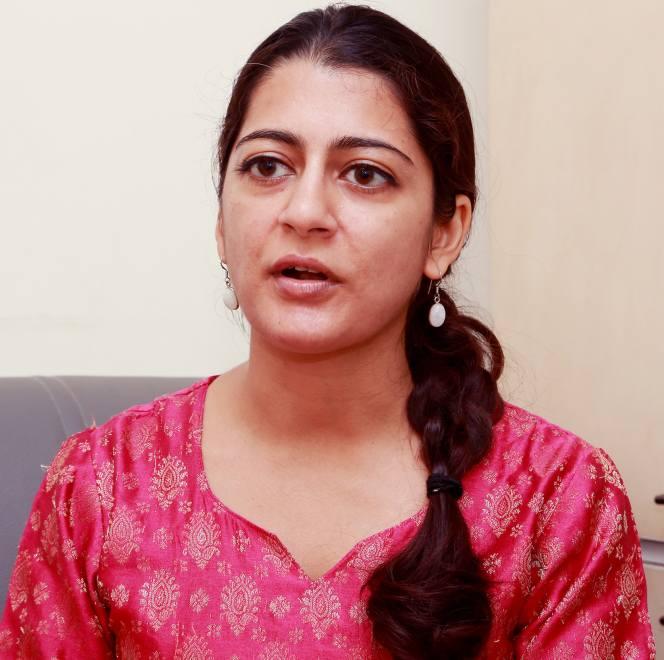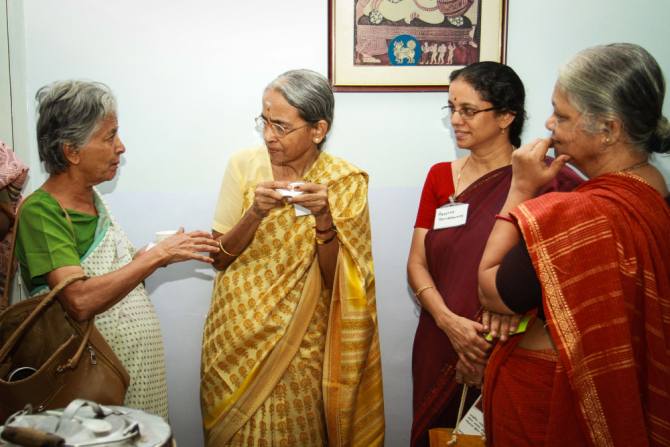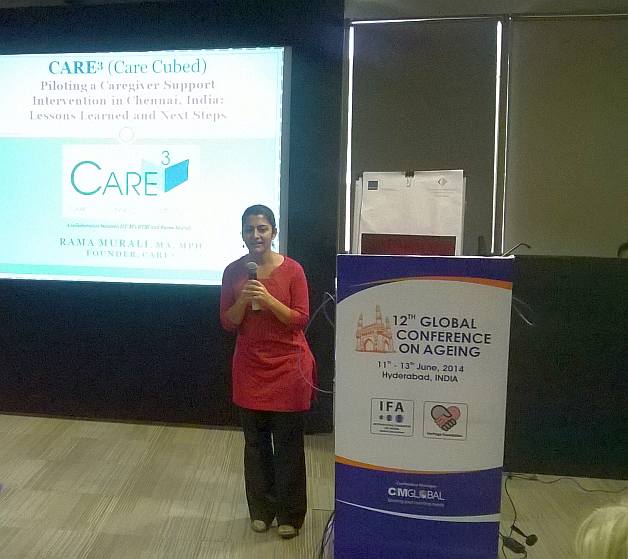
Rama Murali’s CARE3 (read as CARE Cubed) -- care, connect and community – aims to build a strong caregiver community. Shobha Warrier meets Murali, the woman behind the enterprise.
Two years ago, Rama Murali’s decision to return to India after having lived in America all her life was for personal reasons -- to help her mother take care of her grandmother.
After her grandmother passed away, she continued to live in India. That is because of CARE3, (Care cubed), an initiative she launched in collaboration with IIT Madras’s Rural Technology Business Incubator (RTBI).
Her experience as a caregiver to her grandmother taught her what the healthcare system in India so sorely lacked. CARE3 aimed to build a strong caregiver community in Chennai.
"The word 'caregiver' was hardly used. Hospitals sent patients home without giving the caregiver any information on home care. Most of the time, the family doesn't know what to do. Caregivers are also made to feel guilty if they think of themselves,” Rama Murali said.
With the steady disappearance of joint and extended families, especially in urban India, nuclear families run around looking for support in times of crisis like the illness of a loved one. Combined with this is the increase in the number of cases of cancer and other diseases of old age such as dementia and Alzheimer’s disease.
"I hear people talking about how to take care of the ill. But how many think of the person who provides the care?" asks Rama.
Please click NEXT to continue reading

She studied psychology and public health, and subsequently worked as a public health professional and hospice volunteer, helping caregivers. She thus knew the effects of stress on one’s health and the ones that suffer the most stress are the caregivers.
“I found that taking care of close family members -- especially a spouse -- in the absence of support can take a mental and physical toll on caregivers. They are prone to depression and there is also an increased chance of them falling ill. There are instances of caregivers passing away before the sick person.”
Rama started working in Chennai for an organisation specialising in public health care and HIV, even as she helped her mother take care of her grandmother.
In 2011 Rama’s grandmother was diagnosed with cancer, and they realised how poor India’s palliative care system was.
“The doctor whom we consulted had absolutely no idea about palliative care. As I had worked as a hospice volunteer, helping caregivers, I had a good understanding of palliative care. In the US, care can be home-based. Only in an emergency are patients brought to the hospice. Here, nobody provides caregivers with any advice on how to manage the patients at home.”
While working for I-TECH/Arogyaan, Rama met Prof Ashok Jhunjhunwala. He asked her what she wanted to do other than working for I-Tech.
“I told him that I wanted to help caregivers. There was no one doing much work for caregivers in India; they are a neglected lot. If you have a healthy caregiver, you are likelier to have a healthy patient. In India too, the rise in life expectancy has meant that there are more people suffering from ailments.”
Professor Jhunjhunwala suggested she start an organisation to help caregivers.
Please click NEXT to continue reading

She was alarmed. She had absolutely no background as an entrepreneur. The professor said that they had the technology to connect people, and she could leverage it to connect caregivers. He suggested she initially spend time with caregivers to understand their needs.
Rama decided to take the plunge. She met doctors and asked them to put caregivers in touch with her if they needed any help.
She discovered that the word ‘caregiver’ was not used commonly in India and thus not understood. She got only one call.
She then wrote a small article in the local newspaper, Mylapore Times, about the initiative and what caregiver meant. Soon after the article appeared, she got 25 calls.
In April 2013, she arranged the first meeting of all the people who had responded.
Twenty-three people attended the meeting. Forty per cent of them were men. “I was surprised that so many men turned up. They were taking care of their wives and parents.”
A lively interaction followed. “Some women opened up and confessed that they felt angry, guilty and helpless. Some talked about the financial burden they had to carry. The first meeting gave me an idea of what people need.”
After the two-hour-long meeting, everyone agreed that there should be more such meetings. They also came up with suggestions about what they wanted to know, such as information on palliative care nurses, doctors, and emergency numbers.
Rama understood that caregivers needed a support system to share their problems and feelings, as well as information on what to do in an emergency.
“Most caregivers felt lonely and isolated in the small worlds they inhabited. They needed to get out, they needed an outlet to vent their feelings.”
Please click NEXT to continue reading

The second meeting a month later, in May, was a test to see how many will follow up. “There were 13 people and I ran it like a support group of the sort one finds in the USA. Those who came wanted someone to speak on various issues so that they could learn more,” Rama recalls.
Today, in the first half of the meeting a guest speaker speaks on issues that concern caregivers, while the second half is a group discussion on issues affecting members of the group. Rama found that much more of the bonding occurred over tea, especially for those who were too shy to speak in front of a group.
After a lot of deliberation, she chose the name CARE3, the number 3 representing the three Cs: care, connect and community.
“There are three types of care involved: taking care of yourself, taking care of your loved one and also taking care of the community. In all our meetings, we talk about the need to take a minute off and take care of yourself so that you can take care of the patient.”
A year has passed since CARE3 came into existence and its monthly meetings are attended by an average of 28-30 people.
The members contribute to cover the cost of the meetings. “The money has come without me asking for it. They just put money in the jar kept in a corner. That covers our cost for the hall, tea, and other miscellaneous expenses. I would say we are self-sustaining,” Rama says.
Rama also makes home visits to meet the caregiver and the patient personally, so as to understand the problems they face. She uses this information to counsel them if necessary.
“I make sure that caregivers eat and take at least 15 minutes a day for themselves. I focus mainly on the caregivers and not the patients. The response from the caregivers has been extremely positive. They also seem to like the idea of sharing their inner feelings with a stranger.”
Another important function of CARE3 is its database of caregivers, doctors who do home visits, nursing services, palliative care services, physiotherapists, and so on, with recommendations from people who have already used the services.
This is currently available only online, but a printed directory is planned. Rama plans to start training nurses for home care. She is also planning to train young people from colleges as volunteers who can give caregivers a temporary respite.
“To take this to the next level, I need more resources so that we can move to all parts of Chennai, and later, to other parts of the country as well,” she says.
“I wonder why people in India are not giving attention to the very important issue of caregivers. This is a very urgent issue that needs immediate attention,” Rama says. Hospitals must be able to give relevant information to family members on taking care of a patient at home after the patient is discharged.
The most thought provoking comment she heard was from a woman who said, “As caregivers, we are always made to feel guilty if we think about ourselves. But you have got me to think of my needs without feeling guilty. Thank you!”